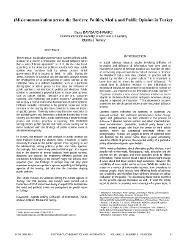| dc.contributor.author | Baybars Hawks, Banu | |
| dc.date.accessioned | 2019-06-28T11:10:51Z | |
| dc.date.available | 2019-06-28T11:10:51Z | |
| dc.date.issued | 2015 | |
| dc.identifier.isbn | 9781941763308 | |
| dc.identifier.uri | https://hdl.handle.net/20.500.12469/1340 | |
| dc.identifier.uri | http://www.iiisci.org/journal/CV$/sci/pdfs/HA178HL15.pdf | |
| dc.description.abstract | During the 1990s advances in statistical and demographic analysis helped the development of an understanding of public opinion as the collective view of a defined population such as a particular demographic or ethnic group. In this view the influence of public opinion is not restricted to politics and elections. Public opinion is considered a powerful force in many other spheres such as culture fashion literature and the arts consumer spending and marketing and public relations. Attitudes and values play a crucial role in the development of public opinion. Different variables embedded in the political social and media structure of the country also have potential to make an impact on public opinion. These dynamics vary from the economics to the judicial system and democratic principles functioning in that country. On the other hand public opinion has a power to shape politics and media's priorities in reporting. The interaction among politics public opinion and media of one country can be better analyzed with the findings of public opinion research administered regularly. In Turkey the research on and analysis of public opinion are most frequent during the election times. Therefore it seems necessary to measure the public opinion more regularly to test the relationships among political public and media agendas. Accordingly the current study seeks to fill this gap. It is argued that in the absence of timely feedback from public surveys decisions and policies for improving different services and institutions functioning in the country might not achieve their expected goal. The findings of surveys may not only yield important insights into public's opinion regarding contemporary agendas of the country but also into the correlates shaping public policies. This article focuses on variables setting the current agenda in Turkey. For that purpose two surveys were carried out in December of 2014 and consecutively in April 2015 to determine the social and political trends and perceptions on gender issues in Turkey. | en_US] |
| dc.language.iso | eng | en_US |
| dc.publisher | International Institute of Informatics and Systemics IIIS | en_US |
| dc.rights | info:eu-repo/semantics/openAccess | en_US |
| dc.subject | Agenda-setting | en_US |
| dc.subject | Diffusion of information | en_US |
| dc.subject | Media and Turkey | en_US |
| dc.subject | Politics | en_US |
| dc.subject | Public opinion | en_US |
| dc.title | (Mis)communication across the Borders: Politics media and public opinion in Turkey | en_US |
| dc.type | conferenceObject | en_US |
| dc.identifier.startpage | 120 | en_US |
| dc.identifier.endpage | 124 | |
| dc.relation.journal | SciVal Topic Prominence | en_US |
| dc.relation.journal | IMSCI 2015 - 9th International Multi-Conference on Society, Cybernetics and Informatics, Proceedings | en_US |
| dc.department | Fakülteler, İletişim Fakültesi, Halkla İlişkiler ve Tanıtım Bölümü | en_US |
| dc.institutionauthor | Baybars Hawks, Banu | en_US |
| dc.relation.publicationcategory | Konferans Öğesi - Uluslararası - Kurum Öğretim Elemanı | en_US |
















